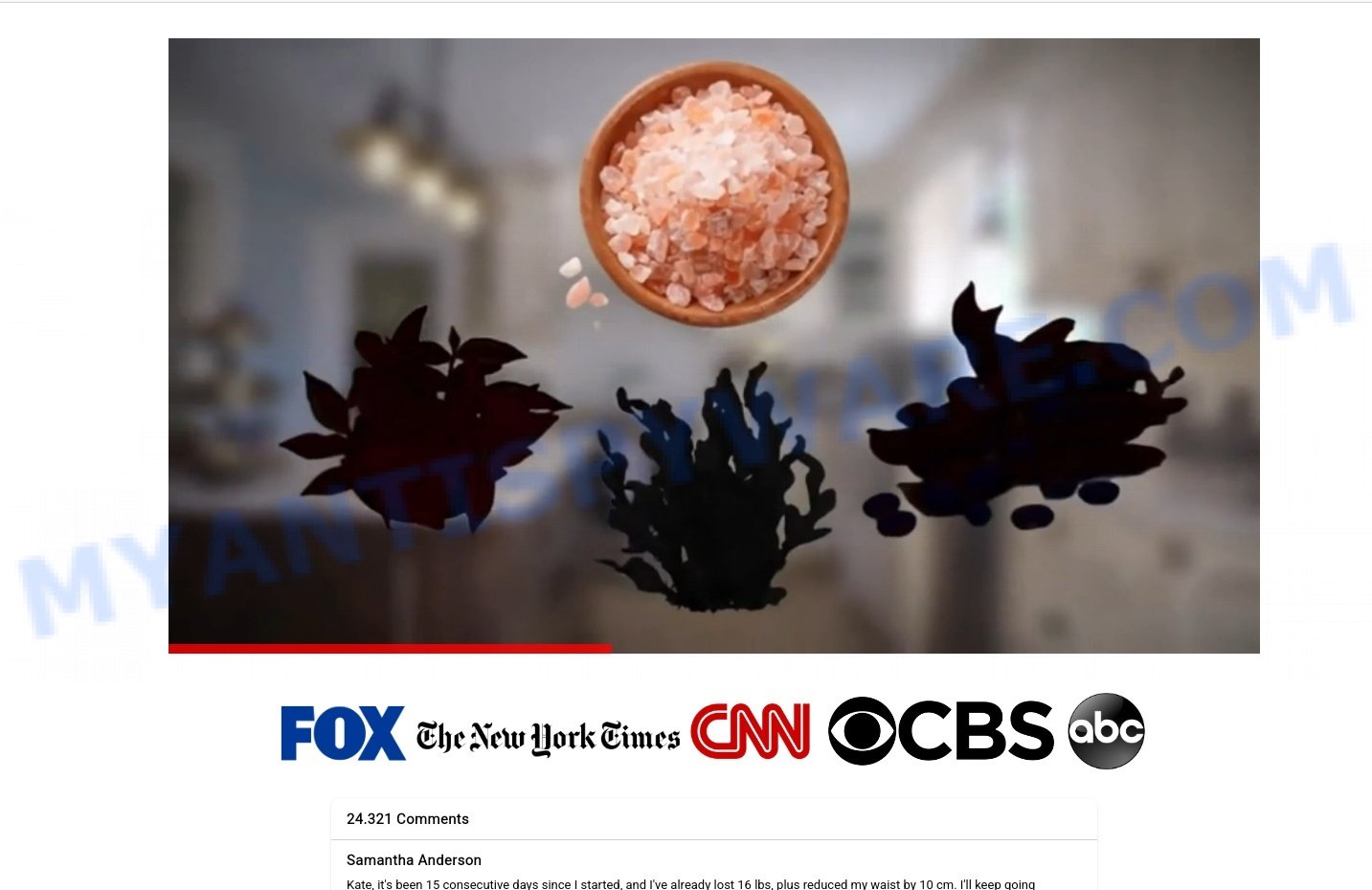Scammers are currently flooding social media with ads for the so-called Japanese Pink Salt Recipe Trick for Weight Loss—a supposedly secret formula that promises you’ll shed pounds effortlessly with zero diet or exercise. These ads appear everywhere, especially on Facebook, directing you to slick articles that look like news reports but are nothing more than elaborate marketing traps.
The sales pitch sounds almost magical: Mix pink salt with a couple of pantry items and “burn 24 pounds in 15 days”. They claim it’s natural, safe, celebrity-endorsed, and even “proven” by Harvard and Oxford scientists. The website “naturalhealthrecipe” tries to look trustworthy with bold headlines like “NEVER MIX THIS PINK SALT WITH THESE 3 HOMEMADE INGREDIENTS IF YOU DON’T WANT TO LOSE WEIGHT FAST”, but it’s riddled with classic scam signals.
Dig a little deeper and the red flags pile up fast. There’s no real proof—just anonymous success stories, fake media mentions, and random name drops of big universities. The alleged author has no credentials, and the branding can’t stay consistent for even one page. It’s all designed to build false urgency and pressure you to act without thinking.
Even worse, when you click to learn more, you’re forced to sit through a never-ending video promising the “life-changing” pink salt secret. But the big reveal never comes. Instead, you get pitched questionable supplements with sketchy names like “Alpha Choose” or “Burn Jaro”. Each product is marketed as a miracle solution, but there’s zero research, no ingredient transparency, and certainly no official stamp of approval.
If you’re tempted by these wild weight loss claims, take a step back. Real health changes come from trusted advice, not from mysterious online concoctions promoted with lies and fake authority. Don’t fall victim to this pink salt scam—your wallet and your health will thank you. Always consult genuine health professionals before trying any new supplements or diet tricks!
Table of Contents
🚨 Is the Japanese Pink Salt Recipe Trick for Weight Loss a Scam?
The so-called “Japanese Pink Salt Recipe” is aggressively promoted online, particularly through Facebook ads, claiming it can help you lose massive amounts of weight quickly—without needing exercise or a diet. These scam tactics target people desperate for a quick fix with deceptive promises and outright lies.

Key Red Flags:
- 🌐 Fake Promotional Tactics: Ads for the Japanese Pink Salt Trick are plastered across social media, often leading to fake news-style articles on suspicious domains like “naturalhealthrecipe”. The sensational headlines and urgency are trademark scam strategies to spark your curiosity and lower your guard.
- ⭐ Fabricated Testimonials and Endorsements: Many ads and sales pages claim the trick has been featured on major platforms (like the Today Show), and even cite endorsements from Harvard or Oxford researchers. However, absolutely no legitimate proof of these endorsements exists—it’s just name-dropping to create a false sense of authority and trust.
- 🔒 Misleading Website Claims: The sites use urgent language (e.g., “BREAKING NEWS”) and dramatic before-and-after stories, promising weight loss results that are medically impossible—like dropping 53lbs in two weeks. Such exaggerated promises are not backed by credible science or real medical professionals.
- ⚠️ Hidden Recipe and Fake Videos: The ads all funnel you to a lengthy video, supposedly revealing the “secret recipe”. The reality? You never get the recipe. Instead, they try to sell you a dubious supplement (like Burn Jaro) using high-pressure sales tactics.
- 📉 Poor Website Quality and Dubious Redirects: Clicking links from these ads often takes you through multiple shady domains, landing on pages with inconsistent branding and long, suspicious URL paths. This is done to confuse visitors and hide the real origin of the scheme.
- 👤 Unverifiable Authors & Social Icons: The supposed authors (“Kate Miller”, etc.) have no verifiable credentials, and social media icons on these sites are usually non-functional or fake, only there to add a false sense of credibility.
- 🔗 High-Pressure & Misleading Sales Tactics: Once on the sales page, you’re bombarded with limited-time offers, urgent countdowns, and claims of low stock—standard tricks to rush you into buying before you can properly assess the product or do your research.
In summary, the Japanese Pink Salt Recipe for Weight Loss is a sophisticated scam designed to deceive consumers. It uses fake promotional tactics, fabricated testimonials, baseless health promises, misleading video content, and aggressive sales techniques to get you to pay for unproven supplements. There is no legitimate “Japanese Pink Salt trick” for weight loss—only a marketing trap. Protect yourself by avoiding these ads and consulting real healthcare professionals for safe, evidence-based weight management solutions.
🕵️♂️ How the Japanese Pink Salt “Weight Loss Trick” Scam Operates
Scammers behind the Japanese Pink Salt recipe trick begin by blasting targeted ads and sponsored posts across platforms like Facebook and Instagram. These ads promise rapid, effortless weight loss—sometimes touting “Burn 24 Pounds in 15 Days” or similar eye-popping claims. They use dramatic headlines, flashy before/after images, and fake testimonials to catch the eye of anyone hoping for a quick fix.
When users click the ad, they’re sent to sketchy websites (like “naturalhealthrecipe.com”) that mimic legitimate health blogs or news articles. The headlines are manufactured for maximum shock, e.g., “NEVER MIX THIS PINK SALT WITH THESE 3 INGREDIENTS IF YOU DON’T WANT TO LOSE 24 POUNDS IN 15 DAYS”. These sites are typically loaded with urgency, fear tactics, and vague warnings to pressure visitors into quick action.
The supposed author often has a generic name (like “Kate Miller”) and zero verifiable credentials. The site’s branding is inconsistent—a red flag indicating haste or a fly-by-night operation. Social media icons appear but don’t actually connect to real, verifiable profiles, further faking credibility.
A big part of the scam is never actually revealing the “secret recipe”. Instead, visitors are encouraged to watch a long-winded video that makes endless promises about ancient Japanese secrets and miraculous results. As the video drags on, viewers are told to wait “just a few more minutes” to get the actual recipe. But at the end, there’s no recipe at all—just a pitch for a questionable supplement (names like “Burn Jaro” often appear). The product names can change, but the sales strategy is always the same: lure people in with supposed natural tricks, then sell them unproven and expensive supplements.
These supplements are promoted with wild claims (“Lose 3lbs in 24 hours!”), name-dropping famous universities (“Harvard”, “Oxford”), or TV shows (“As seen on the Today Show”)—but there’s never any legitimate proof or real studies cited. The supposed endorsements are made up, and badges like “FDA Approved” or “GMP Certified” are used dishonestly. Discount pop-ups, “only a few bottles left”, and fake money-back guarantees are tacked on to pressure people into buying immediately.
If you try to find real customer reviews for these products, you’ll notice either overwhelmingly positive (but suspicious) testimonials on their own site, or nothing but complaints and warnings on independent platforms. Multiple scam reports mention unauthorized recurring charges after purchase and poor or non-existent customer service.
In summary, the Japanese Pink Salt Recipe Weight Loss scam uses social media ads, deceptive websites, fake endorsements, and urgent sales tactics to trick consumers. No scientific backing, no real “recipe” reveal—just empty promises and hidden charges designed to drain your wallet and exploit your hopes.
🤔 Why Such Scams Are Possible
Making Fast Money Off Big Promises
The people behind the Japanese Pink Salt Recipe trick are just trying to get as much money as fast as they can. They do this by making unbelievable promises—like losing 50 pounds in 2 weeks without changing your diet or exercising. These ads use fake celebrity stories, claim experts support it, and post made-up reviews to get your attention before the scam is caught.
Lack of Control on Social Media Ads
Sites like Facebook try to spot and block scam ads, but many still get through. These ads can appear in your feed and seem harmless or even promising. It’s easy for scammers to keep running new ads under different names or accounts, making it hard for social media platforms to shut them all down right away.
🧠 Playing on Your Fears and Hopes
This scam targets people who want to lose weight quickly and easily. By promising huge results in almost no time, claiming the recipe is “natural”, and saying you don’t need to work out or change your eating habits, they try to make you ignore your doubts and listen to your hopes instead.
⚖️ Hiding Behind Fake Claims
Scammers use complicated websites with names like “naturalhealthrecipe.com” and fill them with fake articles, made-up experts, and names of real universities or TV shows to sound trustworthy. They use long, complicated website addresses to hide what they’re actually selling and avoid being tracked down easily if someone tries to take legal action against them.
😱 What to Do If Scammed
If you find yourself ensnared by the Japanese Pink Salt Recipe Scam, immediate action is crucial. Here’s what you should consider doing:
🛑 Stop Further Transactions
The first step is to halt any additional transactions that might be in process. Contact your bank or credit card provider and inform them that you’ve fallen victim to a scam. They can help by blocking the card or reversing any unauthorized transactions.
📞 Report the Fraud
File a report with your local police and provide all the available evidence, such as screenshots, emails, and website URLs. Additionally, report the scam to online portals like the Better Business Bureau (BBB) at www.bbb.org or the Federal Trade Commission (FTC) at reportfraud.ftc.gov. If you’re in another country, reach out to your national consumer protection agency.
💻 Take Screenshots
Before the scam website gets taken down or changes, make sure to capture screenshots of your transactions and communications. These can serve as evidence if you decide to pursue legal action.
⚖️ Consult Legal Advice
Speak to a legal advisor about your situation. While pursuing legal action may be time-consuming and costly, it could be a possible avenue for recovering your lost money.
📢 Share Your Experience
Use social media platforms to share your experience and warn others about the scam. Your story could prevent someone else from falling victim to the same or similar scams.
Summary Table
| Factor | Observations | Impact on Legitimacy |
|---|---|---|
| Product Description | The Japanese Pink Salt Recipe for weight loss is promoted as a secret natural trick that can help people lose a huge amount of weight in days, without exercise or dieting. Ads claim it is based on just four kitchen ingredients and suggest it is safer and more powerful than real medical treatments. There is no scientific proof, and the recipe is never actually provided; instead, buyers are pushed to purchase a supplement. | Negative (False and impossible health promises) |
| Marketing Channels | The scheme uses Facebook ads that lead to fake news style articles. Ads use stories about celebrities and supposed endorsements from major universities and TV shows with no proof. Fake urgency and big promises are used to get clicks. | Negative (Deceptive ads and fake endorsements) |
| Claims and Results | The ads make drastic claims, like losing over 50 pounds in two weeks or burning several pounds in a single day. These claims go far beyond what is possible or healthy with real weight loss methods. There is no evidence to support these outcomes. | Negative (Unrealistic and unsafe claims) |
| Video and Website Tactics | After clicking the ad, users are sent to a long video that delays revealing any real information but keeps hinting at a secret. In the end, it asks viewers to buy a supplement instead of sharing any genuine recipe. The website uses a suspicious, generic domain and complicated URL paths, all signs of a scam. | Negative (Bait-and-switch and manipulative content) |
| Author and Branding | The author “Kate Miller” has no proof of medical background or real identity, and the website uses different names and inconsistent branding to seem trustworthy without proof. | Negative (No real expertise, fake authority) |
| Fake Urgency and Social Proof | Headlines use urgent, scare-tactic language to make people act without thinking. The page shows social media icons that do not link to real pages, faking popularity and trust. | Negative (Pressure tactics and misleading appearance of trust) |
| Supplement Offers | The main goal is to sell supplements like “Alpha Choose” or “Burn Jaro” instead of actually offering a special recipe. Each product is marketed the same way, with no ingredient list or backing from real organizations. | Negative (Sales-focused and no transparency) |
| Scientific Proof | Claims of endorsements from institutions like Harvard and Oxford are made, but there is no real proof at all. No real studies, no medical support, just name-dropping to appear credible. | Negative (No real evidence or support) |
| Transparency and Contact | The website does not give real contact details, has unclear company information, and hides its real management, making it nearly impossible to check who runs the site or where it operates from. | Negative (No transparency and poor consumer protection) |
| Overall Safety | The products are marketed as safe because they are “natural”, but the sites give no real safety details, warnings, or clear lists of ingredients. The risk is high because people may buy unknown substances online thinking they will lose weight quickly. | Negative (Health risk from unproven products and lack of real safety information) |
Conclusion
The “Japanese Pink Salt Recipe” weight loss trick is a scam, relying on fake articles, misleading Facebook ads, and deceptive testimonials to fool consumers. These scammers use wild claims, borrowed authority (like referencing Harvard and Oxford without evidence), and fabricated celebrity endorsements to convince you that their supposed “recipe” or supplement can melt away pounds overnight.
Instead of delivering genuine results, these schemes draw you in with outrageous promises—like losing 24 pounds in 15 days or over 50 pounds in two weeks—which are not only medically impossible but potentially dangerous. The sites mimic reputable health publications, use urgency and fear tactics (“BREAKING NEWS”), and even display fake social proof and media logos. The actual recipe is never revealed; instead, you’re pushed towards buying unproven supplements with hidden ingredients and no credible scientific backing.
The bottom line: avoid anything promoting the Japanese Pink Salt Recipe trick for weight loss. Always be skeptical of sensational weight-loss claims, especially when the marketing strategy relies on manipulative tactics, fake testimonials, and unsubstantiated endorsements. Protect yourself by researching thoroughly—if a website uses clickbait, promises miraculous results, or seems too good to be true, it almost certainly is a scam.



















Ordered a bottle HOWEVER will have a full chemical spectrograph analysis performed (my own equipment, and a 3rd party certified independent chemical analysis and NDT laboratory) to reveal legitimacy of claims and make that analysis public. If legit good — if corrupt FAFO!
TS
06/01/25